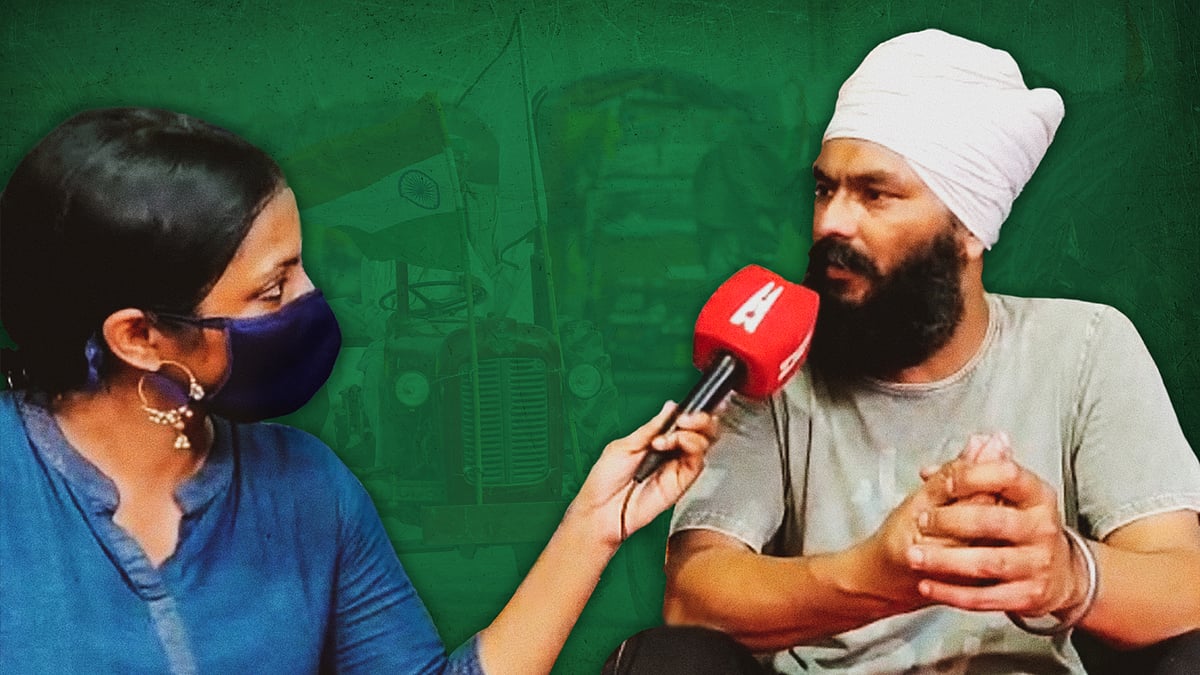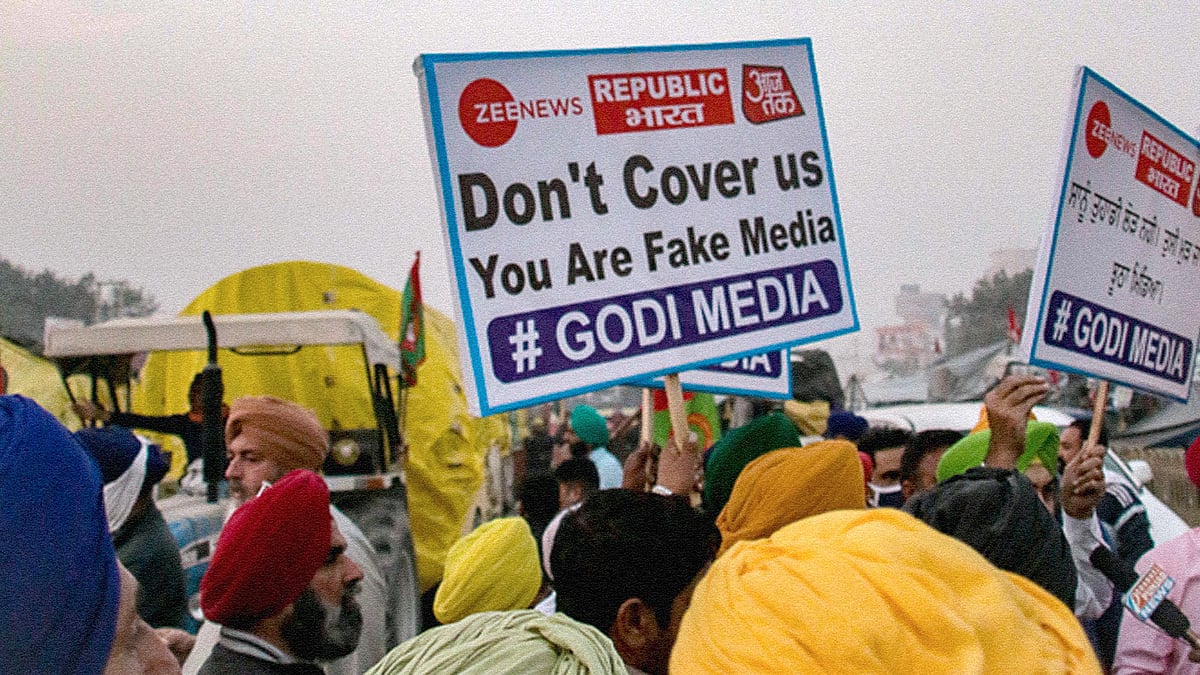Conspiracy theories and sympathy for ‘common man’: News channels got the same memo on Bharat Bandh
ABP, Times Now, News18 and others lamented how the farmers held the public to ‘ransom’.
Yesterday, the Samyukt Kisan Morcha, an umbrella body of 40 farmer groups, led a Bharat Bandh or blockade from 6 am to 4 pm to mark 10 months of their protests against the Modi government’s contentious farm laws. Protests took place across Delhi NCR, Punjab, Bihar, Kerala, Karnataka, Tamil Nadu, and Maharashtra.
The bandh impacted road and rail traffic across the country, as farm groups, trade unions, and protesters blocked highways and railway tracks. The Samyukt Kisan Morcha had called for offices, educational institutes, shops, and industries to close in solidarity, adding that emergency services wouldn’t be affected.
In the national capital, the Delhi-Meerut expressway was blocked in the morning while traffic congestion mounted in Gurugram and Noida, where cops and paramilitary forces checked vehicles entering the city. A good deal of the traffic was thanks to the police barricades and deployments choking the roads.
The bandh also became an occasion for anchors sitting in TV news studios to stand in solidarity, uniting to broadcast identical reports on the protest. These reports focused on two narratives: how the common man or aam aadmi was held “ransom” by the farmers; and how politics had either “hijacked” the protests or the 10 months had led to the farmers wanting to enter politics themselves.
So passionate were the anchors about this that one might even believe they care, deeply, about the common man’s plight. Primetime debates and evening shows on channels like Aaj Tak, ABP News, Times Now, News18 and Republic were so similar last night that it almost seemed like they all received the same memo. Some, of course, added their own twists for originality’s sake.
On her show Logtantra on Times Now Navbharat, anchor Meenakshi Khandelwal showed visuals of traffic, describing them as scenes of “tumult”. “Why should the common man, who slogs for a day’s earnings, keep getting squashed between the farmers and the government?” she asked.

The channel then played videobites from people stuck in traffic who explained how long it took them to reach their destinations. This was followed by visuals of farmer leader Rakesh Tikait saying people should stay home during the strike. The channel also played on loop visuals of 14 traffic-jammed lanes in Gurugram – ignoring the fact that the congestion on this stretch was due to police checking.

Khandelwal then explained that political parties had “hijacked” the bandh, with politics being played out in the garb of protests. The farmers were nowhere to be seen, Times Now Navbharat alleged, just political parties. The channel then took viewers to a market in Azadpur where a farmer at a mandi described the protesters as “terrorists”.
On sister channel Times Now, Rahul Shivshankar declared that his viewers were stuck in traffic thanks to the bandh. Traders couldn’t earn a living, he thundered, because farm leaders had forcibly downed shutters of their shops. Salaried people such as himself had to take pay cuts or sit without jobs during the Covid lockdown and the hours lost to the bandh were crucial to them. We’re not quite clear why Shivshankar went on this tangent but he described the bandh as being characterised by “disruption, intimidation, vandalism and utter disregard.”

Shivshankar then imagined scenarios of the strike – which he later called a “siege” – preventing “sons and daughters” from visiting their “ailing parents”. Later, he told a panelist representing the farmers’ views, “You are holding innocent people, who have nothing to do with your protest, to ransom.” Meanwhile, Times Now ominously flashed the hashtag #AndolankarisGoBack.
Times Now used Times Now Navbharat’s video clips of affected people to make its point, though Shivshankar expanded his diatribe to take a dig at Shaheen Bagh. We expected no less.
Now, given how high emotions were running, could Republic be far behind?
On his show, editor-in-chief Arnab Goswami described the bandh as a form of “blackmail”. “From traffic jams to violence,” he said, “a few andolanjeevis try to hold India to ransom with a Bharat Bandh call...Citizens refuse to tolerate bandh blackmail; it’s andolanjeevis versus nationalists tonight.”

If you’re wondering what an andolanjeevi is, it’s a word borrowed from the prime minister’s vocabulary.
Goswami then brought up the Republic Day protests by the farmers, throwing in a mention of “Khalistan” for good measure. Like Times Now, Shaheen Bagh also found a mention, as Republic proclaimed, “India has seen through the blackmail tactics, whether it was Shaheen Bagh where roads were blocked in the name of anti-CAA protests...And now, when as many as 2,000 andolanjeevis try to hold over two million to ransom with their bandh tactics.
Then it was time for a quick mathematics lesson with Professor Goswami. Two thousand farmers had turned up for the bandh, he said, which is 0.00142 percent of 14-15 crore, which is the total number of “real farmers” in India.
When one of Republic’s nine panelists, Shazia Ilmi, tried steering the discussion towards what the government has done for farmers, Goswami steered it right back. “No no, the debate is not on farmers here,” he said. “The debate is on blackmail...We, the people of India, will not be blackmailed anymore by a group of arsonists.” A shouting match then ensued between Goswami and the panelists. All in all, just another day on Republic.

On its Hindi counterpart Republic Bharat, anchor Aishwarya Kapoor also used the keyword “andolanjeevi” but his coverage of the bandh took a bizarre, and inaccurate, turn. The bandh ended around 4 pm. Yet hours later, when it was night, Republic Bharat’s reporter stood at the Ghazipur border to report on how the bandh was a “flop” – not a traffic jam in sight!
Over at Aaj Tak, Anjana Om Kashyap, who recently returned from her trip to the US to cover Modi’s visit, was back with one-liners on her primetime show Halla Bol. Alleging that “politics” was taking place in the name of protests, Kashyap pointed out that all the non-BJP parties had extended their support to the farmers.
“Jo Modi ke khilaaf, woh kisan ke saath,” she said. “Whoever is against Modi is with the farmers.” She also interviewed Rakesh Tikait and asked him why the public must be “troubled” by protests.
This common man template surfaced yet again on News18 India, where Amish Devgan claimed common people from Uttar Pradesh to Haryana to Bihar were “outraged” and “troubled” by the bandh. He also declared the biggest question of the day: “In this collision between the central government and the farmers, is no one able to see the plight of the common man?”
On ABP News, Rubika Liyaquat bemoaned how the “office-going” public was troubled by the bandh. But her show Hunkaar focused on one statement by Rakesh Tikait, where he said that when the BJP had been in the opposition, it would take part in bandhs too. “But the current opposition is weak,” Tikait said, “it’s not moving its hands and legs much.”
Liyaquat demanded to know whether Tikait was playing the role of the opposition because he thought the present opposition is too weak. She also asked if the farmer protests and bandh had anything to do with the upcoming state elections.

 'If our media was free, things would've been different': 300 days of farmer protests
'If our media was free, things would've been different': 300 days of farmer protests ‘Media has lost our trust’: Why protesting farmers are angry with ‘Godi media’
‘Media has lost our trust’: Why protesting farmers are angry with ‘Godi media’